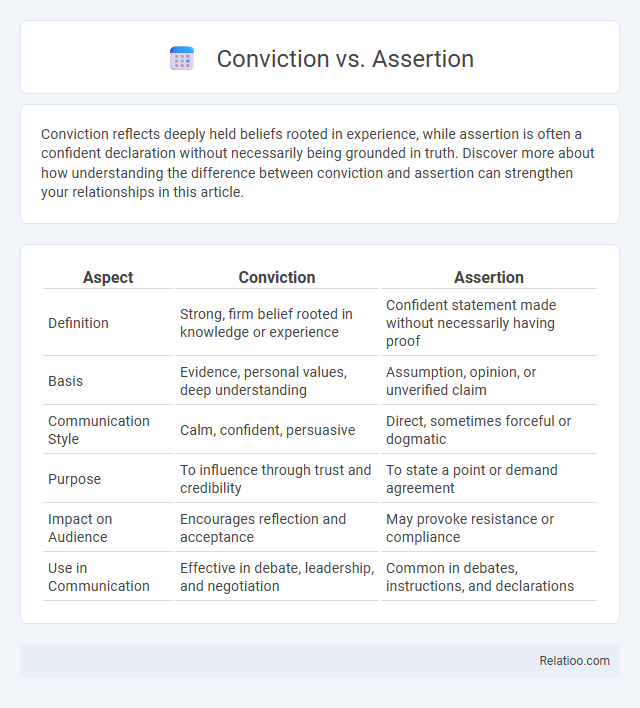Conviction reflects deeply held beliefs rooted in experience, while assertion is often a confident declaration without necessarily being grounded in truth. Discover more about how understanding the difference between conviction and assertion can strengthen your relationships in this article.
Table of Comparison
| Aspect | Conviction | Assertion |
|---|---|---|
| Definition | Strong, firm belief rooted in knowledge or experience | Confident statement made without necessarily having proof |
| Basis | Evidence, personal values, deep understanding | Assumption, opinion, or unverified claim |
| Communication Style | Calm, confident, persuasive | Direct, sometimes forceful or dogmatic |
| Purpose | To influence through trust and credibility | To state a point or demand agreement |
| Impact on Audience | Encourages reflection and acceptance | May provoke resistance or compliance |
| Use in Communication | Effective in debate, leadership, and negotiation | Common in debates, instructions, and declarations |
Understanding Conviction: Definition and Characteristics
Understanding conviction involves recognizing it as a firmly held belief or opinion that shapes your decisions and actions with unwavering confidence. Conviction is characterized by deep-rooted certainty, resilience against doubt, and a strong emotional commitment that distinguishes it from a mere assertion or statement. Unlike assertion, which is a confident claim that may lack thorough evidence, conviction is grounded in profound personal or factual certainty, making it a powerful driving force in behavior and thought.
What is Assertion? Key Traits Explained
Assertion is a confident and forceful statement of fact or belief, often presented without the need for proof. Key traits of assertion include clarity, decisiveness, and a tone that implies authority or certainty. Unlike conviction or belief, assertion emphasizes expressing a position directly and unmistakably to influence or inform listeners or readers.
Conviction vs Assertion: Core Differences
Conviction refers to a firmly held belief or certainty about a fact or principle, often grounded in strong evidence or personal experience, whereas assertion is the act of confidently stating a claim or opinion, regardless of its truthfulness or evidence. Conviction implies a deep sense of confidence and internal acceptance, while assertion focuses on the external expression of an idea, which may or may not be supported by proof. Understanding the distinction is crucial for effective communication, critical thinking, and evaluating the credibility of statements in debates or discussions.
The Role of Evidence in Conviction and Assertion
Conviction is a deeply held belief often supported by substantial evidence, whereas assertion is a confident statement that may or may not be backed by proof. The role of evidence is crucial in transforming an assertion into a conviction, providing the factual foundation that strengthens Your certainty and credibility. Without evidence, assertions remain opinions, but with solid proof, they evolve into convictions grounded in truth and reliability.
Emotional Influence: Conviction Compared to Assertion
Conviction carries a deeper emotional influence than assertion, reflecting unwavering belief and internal certainty that shapes your behavior and decisions. Assertion involves confidently stating opinions or facts but may lack the emotional depth that conviction has, making conviction more persuasive and impactful. The emotional weight behind conviction often inspires trust and commitment, distinguishing it from mere assertion.
Communication Styles: How Conviction and Assertion Differ
Conviction in communication reflects a deeply held belief expressed with confidence and passion, signaling strong personal commitment to the message. Assertion involves confidently stating one's opinions or rights without aggression, balancing firmness with respect for others' perspectives. While conviction emphasizes internal certainty, assertion focuses on clear and direct expression, making both essential yet distinct styles for effective interpersonal communication.
The Impact of Conviction and Assertion on Decision-Making
Conviction drives decision-making by anchoring choices in deeply held beliefs, leading to consistent and resolute actions. Assertion influences decisions by emphasizing confident expression and persuasion, shaping outcomes through clear communication and authority. Understanding the interplay between conviction's internal certainty and assertion's external force enhances leadership effectiveness and strategic planning.
Conviction, Assertion, and Persuasion: A Comparative Look
Conviction reflects a deeply held belief that shapes Your decisions with strong internal commitment, whereas assertion involves confidently stating opinions without necessarily requiring agreement. Persuasion blends emotional appeal and logical reasoning to influence others while conviction anchors personal certainty. Understanding these differences enhances Your ability to communicate effectively and inspire trust.
Common Misconceptions About Conviction and Assertion
Conviction often refers to a deeply held belief rooted in personal values, while assertion involves confidently stating a fact or opinion without necessarily implying strong personal belief. A common misconception is that assertion is always forceful or aggressive, but it simply means expressing your thoughts clearly and respectfully. Conviction and assertion may overlap, yet conviction carries emotional investment, whereas assertion prioritizes clarity and confidence in communication.
Cultivating Healthy Conviction Versus Assertive Behavior
Cultivating healthy conviction involves deeply held beliefs that guide Your decisions with confidence and integrity, while assertive behavior emphasizes clear, respectful communication to express Your needs or boundaries. Conviction is rooted in values and long-term commitment, contrasting with assertion, which is situational and focused on immediate interpersonal interactions. Balancing conviction with assertiveness ensures that Your principles are upheld without compromising positive relationships or emotional well-being.

Infographic: Conviction vs Assertion
 relatioo.com
relatioo.com